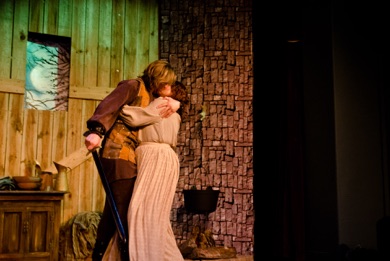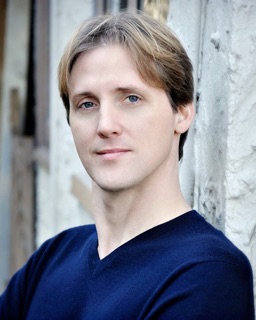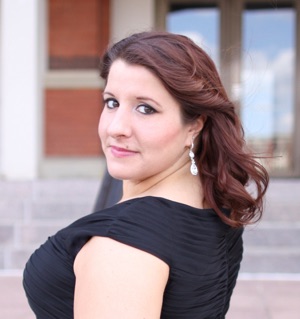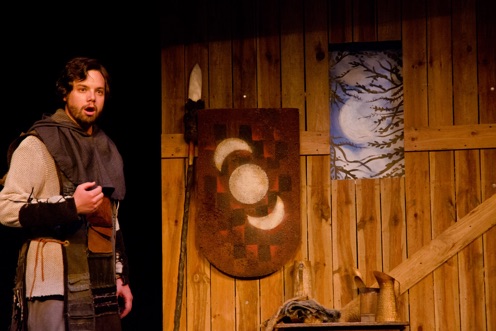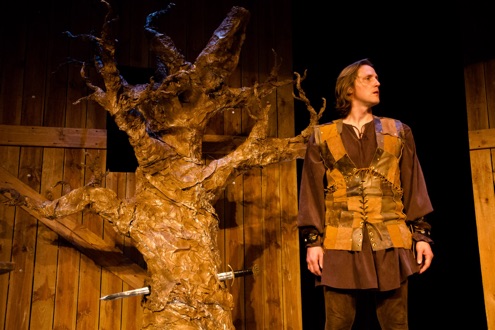Synopsis:
Scene: Hunding’s hut
Scene 1: During a fierce thunderstorm, Siegmund is fleeing a horde of enemies. He seeks refuge in a hut he finds. Exhausted, he collapses on the hearth. Sieglinde discovers him and offers him water and mead. She reveals that both she and the hut belong to Hunding, who will return home soon. As an attraction develops between them, Siegmund tries to leave in order to protect her from the curse that follows him. She urges him to stay, since she already suffers so much living with Hunding that his curse could not make the situation any worse. He agrees to stay and wait for Hunding.
Scene 2: An austere hunting call announces Hunding’s arrival home. He enters in full battle gear and questions Siegliende about the stranger in his house. She explains that she found Siegmund lying on the hearth and gave him some water. Siegmund defends her and challenges Hunding to punish her for her kindness. Hunding backs down and reluctantly grants Siegmund the sacred, inviolable hospitality of his house. He commands Sieglinde to prepare food for them and questions Siegmund about his identity. Siegmund is at first reluctant, but at Sieglinde’s prodding he reveals that he calls himself “Wehwalt” (achiever of woes) because he has suffered greatly. He recounts how his father “Wolfe” (actually Wotan, god of oaths, in disguise under the name “Wälse), raised him and his twin sister. One day, when he was out hunting with Wolfe, the Neiding clan sacked their house, killing his mother and kidnapping his twin sister. He and his father fought the Neiding clan for years until his father suddenly vanished, leaving him alone with only a wolf’s pelt.
Sieglinde asks how he arrived in his present condition without weapons. Siegmund recounts how a young woman called upon him to defend her when her relatives tried to force her into a loveless marriage. He killed the wedding party, but the young woman would not flee and instead stayed put to mourn her brothers. As more relatives arrived to avenge the fallen, Siegmund fought them until they disarmed him and killed the young woman. He then fled into the thunderstorm until he arrived at Hunding’s hut.
Hunding reveals that he was among Siegmund’s pursuers. As his offer of hospitality is sacred and inviolable, he must allow Siegmund to stay for the night, but he challenges him to battle in the morning. As Siegmund is unarmed, Hunding mocks him as being unprepared for battle. Hunding commands Sieglinde to prepare his night drink and to wait for him in bed.
Scene 3: Alone in the hall, Siegmund laments his fate and recalls a promise that his father Wälse made to him: that he would find a mighty sword in an hour of need. He notices a light shining on the ash tree in the middle of the hall and recalls the love that he quickly developed for Sieglinde. She returns to inform him that she has drugged Hunding into a deep sleep so that he can escape. She then reveals to him a sword stuck in the ash tree. She recounts that on the day she was forced to marry Hunding, an old man came to the wedding uninvited, dressed in grey with a hat covering one of his eyes. She immediately identified him as Wälse, and he stuck a powerful sword into the ash tree. None of the guests were able to withdraw the sword. They proclaim their love for one another, and Siegmund easily withdraws the sword, confirming that they are in fact both the children of Wälse.

